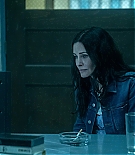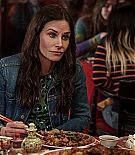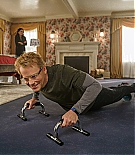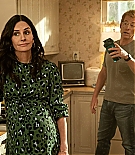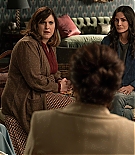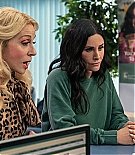Horror icon Wes Craven chomps at the bit to direct Scream 4, bringing back original cast members Courteney Cox, Neve Campbell, and David Arquette. They all sat down with Buzzine to talk about the horror genre, the terror of Ghostface, and the brilliance behind Craven’s direction of the killer.
Izumi Hasegawa: Wes, you seem to hit on some new rules of the Internet age that even I wasn’t aware of. How did you and Kevin [Williamson] go about identifying and creating those rules?
Wes Craven: We both spent a lot of time on the Internet; I think that’s most of our lives. We’ve outgrown that now. [Laughs] I don’t know. We’re just clever fellows. I think old fogies like myself and, to a lesser extent, Kevin use all of those things now, like it or not. Once you start using them, you have to think of the possibilities of how they could be misused too.
IH: Do you think they affect how we watch movies now?
WC: Very much. If you’re in a theater today, people are texting all around you. The little glowing screens–that’s just one example of how annoying it can be.
IH: Courteney, you play a journalist just like me. Has that given you a new point of view? What was it like to play a journalist?
Coureney Cox: I think I’m playing a different kind of journalist, not like you; I’m playing one that wants her own fame, and she always did, so when, ten years later, the murders start happening, she just wants to get really involved so she can write her book and become more famous. She has a one-track mind. I like that part of playing someone who’s so selfish. It’s fun. But it’s a different kind of journalism; it’s really about fame for her, a lot of it, and telling the truth and getting it out there. But she’s pretty silly in some ways.
IH: You haven’t played these characters for a while. Was it easy to get all the mannerisms and the way of speaking back?
Neve Campbell: It’s been 15 years now we’ve been doing these characters, so not difficult to jump into. I had fun watching the films again before we started this, just to get a sense of it, and it was really nice to see that they still hold up really well. But no, it wasn’t difficult to get into the characters. With Sidney, it’s just imagining her circumstances and doing it.
CC: You always play it so real. Neve was so good.
NC: Thanks. So were you.
IH: Wes, I read that you were tweeting fans locally in the town you were shooting in. What kinds of things did you tweet, and what lengths did you go to in order to keep everything under wraps in terms of all the secrets?
WC: Those are two separate things. Keeping things secret was spy work. We did original casting, obviously. Didn’t have to go through it with these guys, but with hundreds of young actors reading pages from the script, we couldn’t have them read pages from the actual script, so we had them reading pages from Scream 1, which was kind of bizarre. But I don’t think we ever read actors with actual pages from the script. There were a lot of things like that that were kind of annoying but necessary to keep things secret. The tweeting was…we did everything from a contest for getting posters for the film as the posters became ready, to having contests for people to identify photographs of weird bugs that we took off of the set when we were shooting at night and all these strange bugs would be falling out of the sky. We kept the fans aware that we were filming and that we knew they were out there. I have to say, it was very intriguing to see how quickly people answered. Our co-producer, Carly Feingold, got it all really rolling for me. People were answering within 30 seconds, 15 seconds sometimes, from Germany, other parts of the world, so it made me realize that even the process of filming, how different this reality was from even e-mails. Just much, much quicker and worldwide.
IH: Wes, since we’re talking about rules in this movie, do you think horror movies will always be bound by those rules, or is there a way to break it?
WC: I think the very essence of the Scream films is that we break the rules. We establish or state what the rules are, and then we immediately break them. That started right in Scream 1 when you say, “I’ll be right back,” and you’ll die, and the person who says that is one of the killers. If you have sex, you’ll die, and Neve’s character has the first sexual encounter of her life, and she’s one of the survivors, actually. We like to establish what the rules are, but they’re really the clichés, and as soon as they’re stated in the Scream films, we almost always break them. It makes the audience not know what to expect next. If they think they know what the rules are, we immediately say, “No, you don’t.”
IH: How do you work it out to where you take the darkness off of the film when you’re done? Do you go do fun things with your kids? Do you go to a spa, or make a kids’ movie or something? What do you do to get the Scream film off of you?
CC: You take a hot shower.
NC: We were having fun during the filming. We would often just go and have dinner and a nice glass of wine and have some laughs, so even during it, you’re not feeling like it’s this really intense experience or dark experience, because there’s a lot of humor in these films as well. You can’t take them incredibly seriously. Part of the fun of these is that they’re so self-referential and make fun of themselves.
CC: If it was a devil-possessed kind of movie, I probably wouldn’t do it because I’d be so scared. This one, you just need to get the corn syrup off and hope that someone’s ready to hang out.
IH: What are the challenges in bringing the story to a newer audience? You’ve got a long established fan base, but you’ve got this new audience now…
David Arquette: It’s really interesting. We’ve done these for 15 years, and the connection we’ve all made and that this fourth film is bringing to life the first one, and having fun with it…and there’s been 10 years in between with different horror films and technology changes. It’s just really exciting. I think, with the new cast coming to this, it was really interesting to see because they’re reflections of us when we first got there. It really brings an electricity that I felt on the first film with this, and I think people with that generation are going to discover the old stuff. I was talking to my friend’s girlfriend the other day, who was nine when she snuck in to see the first Scream, and she’s horrified of horror movies now, and she can’t even see the next one. This is a 20-something-year-old woman. It’s so wild, the way time flies.
IH: Wes, everyone knows you’re a master of horror, and nobody can take that from you…
WC: Oh yes they can. Have you read the reviews of my last movie?
IH: People have been questioning the stuff you’ve been doing the last year. I’m concerned about the way that fans, general audiences, and critics are going to react to this movie. Is that something that still makes you nervous? Also, there have been some rumors on the Internet that there have been a lot of changes to the script. Are you satisfied with the results of the script that you finally used for the movie?
WC: We’re all pleased with the way the script turned out, and it was the result of Kevin [Williamson]’s original master script, and Aaron did a decent amount of work on specific scenes and areas of it. I wrote sections of the film myself, but it very much is Kevin’s concept and characters and situations and overarching framework for the film. As far as worrying about what people think, yeah, you do a film like My Soul to Take and people think it sucks – that hurts. We put a lot of work into it and it’s a good film, but you go on. The good feeling about doing this film was getting back with old friends, working on something that I thought was really good, and having a chance of being a little bit more recognizable to an audience, and saving my career.
IH: I think everyone would agree that Wes has a real gift for keeping his films scary and fun in sequels, which is really rare in horror films. What do you think is the secret ingredient that makes his movies so consistently scary?
CC: He’s an amazing filmmaker. He is the master of this – he’s made three of these films now, four of this particular film, and he’s always watching. He’s so current on everything. I don’t even know what MySpace is; he’s watching things and learning. He’s constantly bettering himself, his mind. He’s amazing. And the way he directs Ghostface – the way he has his head, “Tilt his head!” – it’s so eerie. There’s something about Wes; he’s just like a choreographer when it comes to Ghostface. He’s just a great director.
NC: Shots and timing and music. Wes just told me today that Marco [Beltrami] did all of the films, and Wes found him on the Internet, and he’s now become this phenomenal composer and very successful. Wes has a really great eye and ear and taste in casting, writing, and all the people who get involved in the film. He’s also just phenomenal with timing, humor, and with scaring people.
DA: He actually made a swinging houseplant very scary in this film. That takes incredible talent.
IH: When watching horror films and you come to the scary part, are your eyes fully open or partially closed? Are you a screamer?
CC: The last two.
DA: I just get a kick out of watching the audience too. I love when you go to a horror film with real horror fans, and everybody’s there watching, getting involved and screaming. That’s when it’s most alive and exciting for me. Wes brings that out in these films.
NC: These films are a rollercoaster ride; I think they’re great fun to watch. I usually cover my eyes and scream and cry during horror films. But like David was saying, they’re just great fun.
IH: The movie touches upon the theme of celebrity, how people perceive it, and what people do to achieve it. How do you think the definition has changed over the years, and what do you think the public sees celebrity as?
NC: It’s definitely shifted with reality television. It’s much easier for people to become famous nowadays, and not for a whole lot of anything. So I think the mentality has definitely changed. I think that’s a bit sad. But it is what it is, and people love reality television, and we love the gossip magazines. We’re not too impressed with our politicians, and we look for other things to look up to in some way. Whether that’s healthy, I don’t know, but it’s definitely switched.
IH: Neve, David and Courteney, what do you think about playing alongside Hayden Panettiere and Emma Roberts, the newcomers?
NC: It’s great! Courteney and I looked at each other and were like, “We could be their mothers.”
CC: Grandmother.
NC: But they were good. They came with so much enthusiasm to the project. People keep asking whether we had to show them the ropes, and they’re professionals in their own right; they’ve had long careers already at young ages, and they came in and they did a great job.
IH: How did the idea of a script come after ten years? Is there going to be a script for Scream 5?
WC: Through time travel? How it came about, I don’t know. How do these things come about? Bob Weinstein, of the two Weinstein brothers, is kind of a godfather of Scream; he’s the man who bought the original script from Kevin. I think he and Kevin were talking, and he felt it was time. He originally told us, I think after Scream 3, that there were not going to be any more for a long time, that he didn’t want it to feel like we were just knocking them out to make money, and of course there was the Scary Movie sequence, the series, so we needed to get some distance from that. But I think, at the end of the decade, there was a feeling that this was the perfect time to turn around and look at the first decade of the 21st century, and it was quite distinctive from others – 9/11 hovering over things, and certainly the presence of the electronic media being brought down to the people to the level where everybody is online, everybody can Facebook, people are tweeting all over the world, all the time. It’s totally different. So it was time to take that into account. At the same time, the cinema was changing very much. You weren’t just watching movies. I have a step-daughter that’s 20 years-old — she’s watching movies on her computer or her phone. The whole business, as you well know, is changing dramatically, and the way fans follow the movies and participate in the movies and make their own movies to emulate those movies is profoundly different. So it felt like this is time to make a screenplay that can reflect all this newness.
